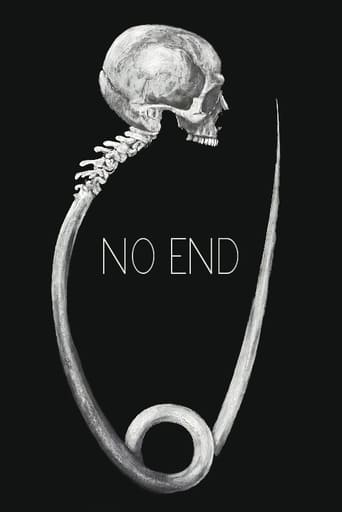Pluskylang
Great Film overall
AnhartLinkin
This story has more twists and turns than a second-rate soap opera.
InformationRap
This is one of the few movies I've ever seen where the whole audience broke into spontaneous, loud applause a third of the way in.
Jerrie
It's a good bad... and worth a popcorn matinée. While it's easy to lament what could have been...
TheLittleSongbird
What has been seen of Krzysztof Kieslowski (almost all his films and 'Dekalog' in its entirety) all ranges between very good (the 8th episode of 'Dekalog') to masterpiece ('Three Colors: Red' and 'Blue' and the whole 'Dekalog' series). To me, he was an immensely gifted director, who died far too early.'No End' is not one of Kieslowski's best, but like 'Camera Buff' it is another early film of his that deserves more love and attention. It may be alienating and strange to some viewers (its, as reasoned, pro-solidarity sentiments must have been reason enough for it to not be released internationally for over a year) and his more international work is somewhat more accessible. However, while some of the political story could have had more clarity in places, 'No End' is great in many ways with all the typical Kieslowski strengths that make his films so good.As was always the case in Kieslowski's work, 'No End' is made exceptionally. As well as being beautifully shot with atmospheric use of colour to match the mood, it is gritty yet beautiful with many thoughtful and emotionally powerful images and little things lingering long into the memory. Kieslowski's direction is quietly unobtrusive, intelligently paced and never too heavy. The music is suitably intricate.It's a thought-provoking film in writing, as ever thematically rich and with complex characters, and resists the trap of rambling. The 3-part story is intriguingly told, and while the political story could have done with more clarity the emotional story is harrowing and affecting and the metaphysical story fascinating. 'No End' is always engaging and suitably challenging. The acting is as always from Kieslowski marvellously nuanced and natural, especially from heart-wrenching Grazyna Szapolowska.Summing up, not among the best work of Kieslowski but deserves more love as a result of being overshadowed by his later stuff from 'Dekalog' onward. 9/10 Bethany Cox
denis888
This is a real pleasure to both eye and mind. The untimely demised Mr. Kislowski was a true genius of Polish cinema and with this excellent film he again proves it. The film is divided into two genres, if it may be said so - one is a mystic one, where we see the ghost of a dead Warsawa lawyer, Antek, when he watches his widow and his little son and their life from the ether and the only creature that sees him is a big black dog. The other plot is a deeply tragic and serious story about 1982's Poland, when the anti-Communist political movement called Solidarnosc (the Solidarity) was banned, the country suffered curfews, arrests and political trials.The widow of Antek, Ulla, is a famous translator, and she is devastated with her husband's death. She starts to help the wife of a man who is in prison, who was in Solidarnosc's actions and who was Antek's client. So, now that Antek is dead, another lawyer, his teacher, an elderly man takes the case, and his young assistant also helps him. The story tells us about the small and still tragic events of their lives. We see the unbent Solidarnosc activists, who meet secretly in their shabby apartments. We see Ulla's soul struggle when she is rushing from one extreme to another, having a quick date with an American, having help from the Solidarity people, having troubled relations with Antek's friend. We see and feel her pain, her mute suffering and her constant plea for her late husband. Finally, when the case is won, and that young man is released right during the trial, Ulla decides to take her life and finally join Antek. The cast is superb, we see young Marek Kondrat among others, we see other great actors and we feel the same pain they all suffer in those bleak, cold, merciless days of repressions and purges. A serious, earnest film for all who think.
paul2001sw-1
Krystoff Kieslowski is today best known for his last four films, made wholly or partly in France, which in some ways is a shame, as while these movies are not without merit, they are outshone by the massive brilliance of his earlier, Polish work. Kieslowski was, of course, the greatest visual poet of communist architecture; and there's also something magical about the way he communicates the most intense emotion behind the facade of Slavic stoicism (witness, for example, in this film, the scene where the car is taken by the police). And also there was the subtext of the political beneath the personal, never more apparent than in 'No End', set (and, courageously, made) in the aftermath of the impact of the Solidarity movement on Polish society. In the face of civil unrest, the government had declared martial law, hoping to stave off a "friendly" Russian invasion; but system had lost confidence in itself, and had already effectively negotiated its own demise by the time the collapse of the Berlin wall finally cast it into oblivion. It's in this intermediate period, where normality intermingled with fear, that 'No End' unfolds, a drama that combines moral complexity and human sympathy in equal measure.The first words of dialgoue in this film are "I died". Billy Wilder had planned to start 'Sunset Boulevard' in a similar manner, but the suits didn't like it and that film makes less sense as a result of the changes they demanded. More recently, films like 'Truly, Madly, Deeply' and 'The Sixth Sense' have repeated one idea explored in 'No End', that of the ongoing relationship between the living and the dead. But whereas both of those films are weighted down by obvious sentimentality, the opening speech in 'No End' is simple, disturbing, painfully real and yet leads naturally into something far more than a ghost story, a tale in which there is no right and wrong, but in which the mixed motives of the characters only illuminate their humanity.Kieslowski is famous for his collaboration with Zbigniew Priesner, who wrote wonderful scores for this film (and all it's successors); but watching it, one is also struck by how well he used silence. He also had a talent for finding the most wonderfully expressive faces: the lawyer (Aleksander Bardini), the wife (Grazyna Szapolowska) and the client (Artus Barcis) all went on to appear in his 'Dekalog'. It's impossible to imagine a better actor than Bardini for his role; while Szapolowska appears more beautiful than any Hollywood starlet precisely because of the complete lack of glamour with which she is shot; her portrayal of a woman holding things together in the face of an unconquerable grief is wonderful and immensely sad.There are so many moments of brilliance in this film, almost of all them unflaunted; the moment where the woman's son interrupts her phone call; the tiny flinch induced when a door closes behind her, the way that light floods a previously darkened room; the speech of introduction uttered by the lawyer; Kieslowski constantly finds the subtlest of ways to shed light on his subjects. This is a ten star film, made by a master, grounded in its era but which speaks of so much more. Now released on DVD, it has to be seen.
adam zerda
Although there is the obvious plot of the grieving wife, the movie is really about Poland under martial law. Probably unable to directly focus on such political topics, Kieslowski attempts to 'hide' this other side beneath a twisted Ghost subplot.A dark movie, one that demands attentive viewing, this one will probably never be as successful as some of Kieslowski's other works, which have probably led its viewers to pick up this one.

